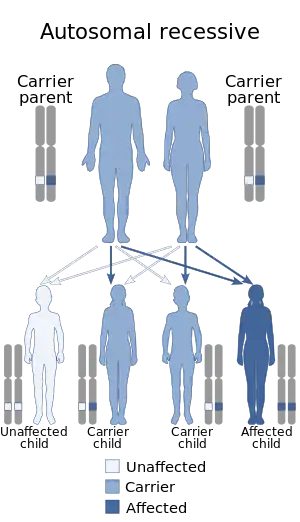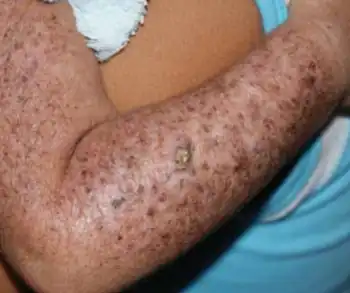DeSanctis–Cacchione syndrome
| DeSanctis–Cacchione syndrome | |
|---|---|
| Other names: Xeroderma pigmentosum with neurologic manifestation[1] | |
 | |
| DeSanctis–Cacchione syndrome is inherited in an autosomal recessive manner | |
DeSanctis–Cacchione syndrome or Xeroderma pigmentosum is a genetic disorder characterized by the skin and eye symptoms of xeroderma pigmentosum (XP) occurring in association with microcephaly, progressive mental retardation, retarded growth and sexual development, deafness, choreoathetosis, ataxia and quadriparesis. [2]
Signs and symptoms

Arm demonstrates hypochromic/ achromic, hyperchromic,lentiginous lesions
The clinical presentation of this condition is as follows:[3]
- Ataxia
- Conjunctivitis
- Photosensitive skin
- Ectropion
- Gonadal hypoplasia
- Hyporeflexia
Genetics
In at least some case, the gene lesion involves a mutation in the CSB gene.[4]
It can be associated with ERCC6.[4]
Diagnosis
The diagnosis of DeSanctis–Cacchione syndrome is done via the following:[3]
- Medical exam
- Medical history
- Lab test
- Genetic test
Treatment
Management revolves around protection from sunlight so as to not have other complications (skin cancers).[5]
See also
References
- ↑ RESERVED, INSERM US14-- ALL RIGHTS. "Orphanet: De Sanctis Cacchione syndrome". www.orpha.net. Retrieved 11 October 2019.
- ↑ Rapini, Ronald P.; Bolognia, Jean L.; Jorizzo, Joseph L. (2007). Dermatology: 2-Volume Set. St. Louis: Mosby. ISBN 978-1-4160-2999-1.
- 1 2 "De Sanctis-Cacchione syndrome | Genetic and Rare Diseases Information Center (GARD) – an NCATS Program". rarediseases.info.nih.gov. Archived from the original on 17 April 2021. Retrieved 10 December 2021.
- 1 2 Colella S, Nardo T, Botta E, Lehmann AR, Stefanini M (May 2000). "Identical mutations in the CSB gene associated with either Cockayne syndrome or the DeSanctis-cacchione variant of xeroderma pigmentosum". Hum. Mol. Genet. 9 (8): 1171–5. doi:10.1093/hmg/9.8.1171. PMID 10767341.
- ↑ "De Sanctis Cacchione Syndrome". NORD (National Organization for Rare Disorders). Retrieved 10 December 2021.
{{cite web}}: CS1 maint: url-status (link)
External links
| Classification |
|
|---|---|
| External resources |
|
This article is issued from Offline. The text is licensed under Creative Commons - Attribution - Sharealike. Additional terms may apply for the media files.